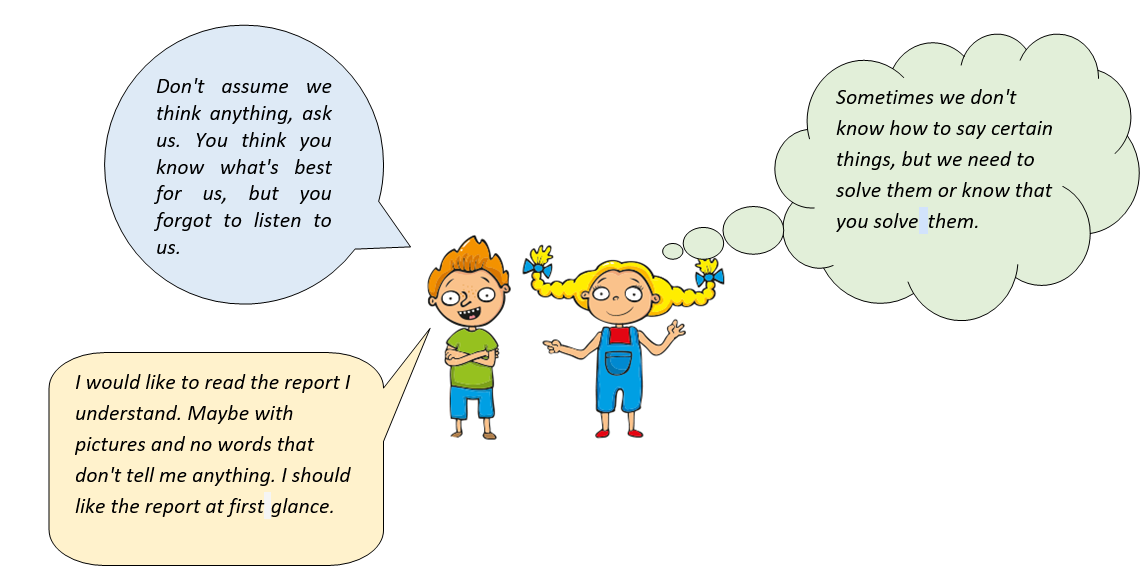Expert focus groups
Hlavní stránka Projekty Ukončené projekty CP4Europe – Strengthening National Child Participation Frameworks and Action in Europe Activities Expert focus groups
„As the experts, we already know that participation is YES. But the question remains how to motivate all people working with children to be able to involve children in their daily practice so that it fits the children.”
This is one of the opinions of experts from the focus group, which maps whether, under what circumstances, in what situations and in what forms adults working with children have mechanisms in place for their involvement.
The team of the Ministry of Labour and Social Affairs (MoLSA) organized an online meeting of 42 professionals, where they verified the fulfillment of the indicators of the unique CPAT tool for mapping children's participation. In addition to a focus group of children, a focus group of experts is a key tool for determining the level of participation of children in various areas of life and processes.
The activity is a part of the Council of Europe's project "Children's Participation in Europe - Strengthening the National Framework and Children's Participation Activities", which focuses on the involvement of children and adolescents and on the development of participatory policy at the national level.
During the meeting, the MoLSA team introduced a group of young self-advocates and their conception of participation through a video prepared by LUMOS organisation. In the form of short quotes, the MoLSA team also shared findings from earlier focus groups of children on the topic of their involvement, and experts were given their most important messages.

Through discussions with experts, the MoLSA team found out whether, according to their experience, children are informed about their right to participate, whether they understand it and by whom they are or should be informed about their right to participate. Experts agreed that children must be actively informed about their right to participate, they must have the opportunity to experience participation in everyday situations. "Children need to be able to decide on pleasant things first, then they will not be afraid to decide on the unpleasant ones." Children need to receive information that are consistent and in a way that they understand. The most important thing is that participation is a right, not an obligation.
|
SOMETIMES A WELL-INFORMED CHILD LEAVES A MEETING, EVEN IF WE LEARNT NOTHING. AND IT IS ALSO OK. IT IS ALWAYS NECESSARY TO HAVE TIME FOR THE PARTICIPATION. |
The MoLSA team, together with experts, sought an answer to the question: "What are the mechanisms for the safe exercise of children's right to participate in administrative or judicial proceedings?" Familiarization with this right occurs only when they find themselves in a difficult situation for them, such as parental separation, school problems or relationships.
|
CHILDREN ARE SOMETIMES SURPRISED THAT THEY HAVE SOME RIGHTS IN DIFFERENT PROCEEDINGS. |
The team also addressed the area of complaints and the mechanisms for complaining and being heard. Experts named that children have the opportunity to provide feedback on the service / activity in which they are involved, by a variety of options (interview, online questionnaire for complaints, emotional cards, questionnaires, in writing). Experience has shown that not all selected tools are suitable for children. It is important to adapt the form to the age and mental abilities of the children. At the same time, children need to feel that it is safe to communicate their views. It is advisable to take into account that the child will evaluate the proceedings and the process after its completion and set the possibility of feedback with the passage of time.
|
IT IS IMPORTANT THAT CHILDREN KNOW WHY THEY COMMUNICATE FEEDBACK AND WHAT WILL HAPPEN TO IT. |
The MoLSA team was looking for answers to the question of whether there should be an independent institution controlling exclusively children's rights and what / whom should it control? “It is important that there is an independent institution in the Czech Republic that protects children's rights. But it is more important that children understand this and are not afraid to turn to it." At the same time, the experts pointed out that "there are already institutions in the Czech Republic that have the rights to protect children - social services, social and legal protection bodies for children, the Public Defender of Rights and others". If a new function were to be introduced, it would be good at first clearly define how and who should deal with children's rights, so that it is clear what an independent institution can control.
|
IT IS IMPORTANT THAT CHILDREN KNOW WHO THE CHILD OMBUDSMAN OR OMBUDSWOMAN IS AND WILL NOT BE AFRAID TO CONTACT THIS INSTITUTIONS. |
The experts mentioned that they perceived sufficient support in the legislation for involving children in decisions that affect them. However, they said that legally it could be described, but the question is whether we work with it as adults.
|
IT IS NEEDED TO BE SENSITIVE TO THE LEVEL OF CHILDREN´S INVOLVEMENT IN DIFFERENCT PROCEEDINGS, BECAUSE IT CAN BE VERY DEMANDING FOR CHILDREN. |
Experts have agreed that the topic of participation has changed over the last 10 years and there is currently a wealth of materials available on the topic of participation.
|
PARTICIPATION NEEDS TO BE TALKED AND SHARED AMONG COLLEAGUES AND EXPERTS FROM OTHER SECTORS WORKING FOR AND WITH CHILDREN. |
And what would adults say to children?
"If you can't confide in anyone you know, you can confide in someone you don't know. An anonymous Safety Line, for example. "
"In order for the judge to decide in your best interests, he should know not only your opinion, but also more things about you, how you perceive your parents and the situation at home. But it's up to you to take advantage of it. "
"We parents love you, we learn that."



